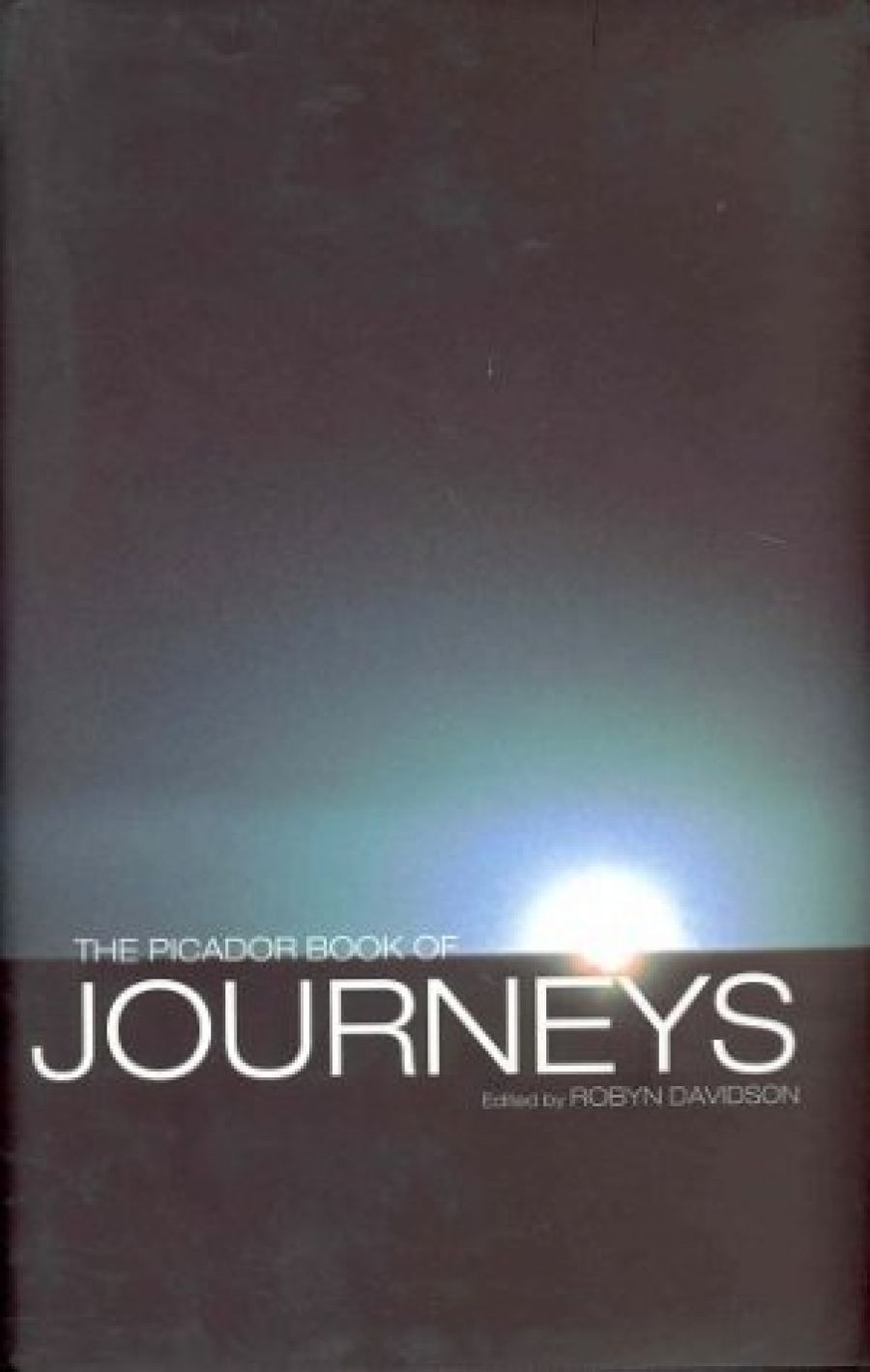
- Free Article: No
- Contents Category: Travel
- Review Article: Yes
- Online Only: No
- Custom Highlight Text:
Aged twenty-two, I set out for Mexico, with, like Rousseau in Italy, a ‘heart full of young desires, alluring hopes and brilliant prospects’. I was determined to leave the confines of the sleepy metropolis that is Canberra, much as Isabella Bird, though infinitely more adventurous and literate, desired to escape her cloistered Victorian world. This ‘inner compulsion’, as Robyn Davidson describes it in her introduction to The Picador Book of Journeys (something her own books attest to powerfully), is a factor which gives travelogues ‘the power to reconnect us with the essential’. And if, by essential, one means illuminating the human condition in the way that any literature worth the name achieves, Davidson’s anthology gives us a sizeable sample.
- Book 1 Title: The Picador Book of Journeys
- Book 1 Biblio: Picador, $21 pb, 477 pp
The emphasis of the title on journeys rather than travel is justified by these tales of the unexpected, as explorers, musicians, poets, filmmakers, novelists, a slave, a lepidopterist, all make their way from ‘point a to point b’. Many of these journeys are undertaken because of necessity: the ten-year-old Tobias Wolff and his mother driving from Florida to Utah in a futile search for work; Nadezhda Mandelstam facing exile with her husband in Voronezh; and Esteban Montejo finding refuge as a runaway slave in Cuba’s forests. One of the most affecting is Jakob Walter’s ‘Diary of a Napoleonic Foot Soldier’, a forthright tale of the brutality of war on the Russian Front in midwinter, in which Walter’s ingenuity and instinctive humanity pull him through.
The extracts are divided by country, roaming from Spain, France and Italy to America, Australia, India, Africa and South-East Asia, with countries a good deal smaller in between (and only London standing in for Britain). There is a brief excerpt from Auden’s Letters from Iceland, a mere paragraph on Sweden from Kafka’s Diaries, likewise Claudio Magris on Slovakia, an ironic take on the benefits of travelling by foot. These pithy accounts do not, though, reflect any underlying equivalence in the size of the country, for Derek Walcott gets fourteen pages for the Antilles (his acceptance speech on receiving the Nobel Prize for Literature) and Joan Didion ten for El Salvador; perhaps inadvertently, they point up the widely diverse writers on display. Didion’s is, as might be expected from such an acute writer, a brilliantly observed piece of journalism, caustic and wrenching in its portrayal of the fear that permeated El Salvador during the military regime of the 1980s. Walcott’s speech celebrates Trinidad and the making of poetry; it is opulently wordy, referential and gently aggressive on the aftermath of colonialism: ‘Visual surprise is natural in the Caribbean; it comes with the landscape, and faced with its beauty, the sigh of History dissolves. We make too much of that long groan which underlines the past.’
Overwhelmingly, all the extracts indicate Davidson’s attraction to authors who possess a clearsighted honesty about themselves, their culture, their fellow beings. This is at times expressed earnestly, as in V.S. Pritchett’s The Spanish Temper (‘the Spanish live in castes but not in classes, and their equality … is in their sense of nobility or, rather, in the sense of the absolute quality of the person’); at others, humorously articulated: Dostoyevsky on meeting fellow Russians abroad (A Writer’s Diary, Volume One). Australian Molly Nungarrayi’s ‘How We Fled When I Was a Girl’ is utterly simple and moving. Katherine Mansfield is brutally frank about her hatred of ‘L. M.’ as she languishes in San Remo, waiting for John Middleton Murray to join her, and Isabella Bird has had just about enough of her Reformed Presbyterian hosts in Colorado: ‘this hard greed and the exclusive pursuit of gain, with the indifference to all which does not aid in its acquisition, are eating up family love and life throughout the West.’
With any anthology, it is customary to have the odd gripe about the presentation (it was annoying not to have the original publication dates of the books, as well as the dates of the authors), and to ask why this or that writer is absent. So, I idly wonder why no Edith Wharton, Patrick Leigh Fermor, Norman Lewis, Gertrude Bell, D.H. Lawrence, and suddenly realise the list is endless. While it is a shame that there is nothing on Greece, it is enormously pleasurable to read again Joanna Greenfield’s ‘Hyena’, first printed in the New Yorker. It has little to do with Israel, the only story under that heading (and this is somewhat perverse of Davidson, given the region’s history), but it is a visceral, heart-thumping story of how, while working at a breeding site for endangered animals, Greenfield was attacked by a hyena.
The longest extract of the collection, and deservedly so, is from The Worst Journey in the World, an astonishing book by the modest, heroic and compassionate Antarctic explorer Apsley Cherry-Garrard. It is, as Robyn Davidson, says, a classic which reminds us of ‘a species lost to time’.


Comments powered by CComment